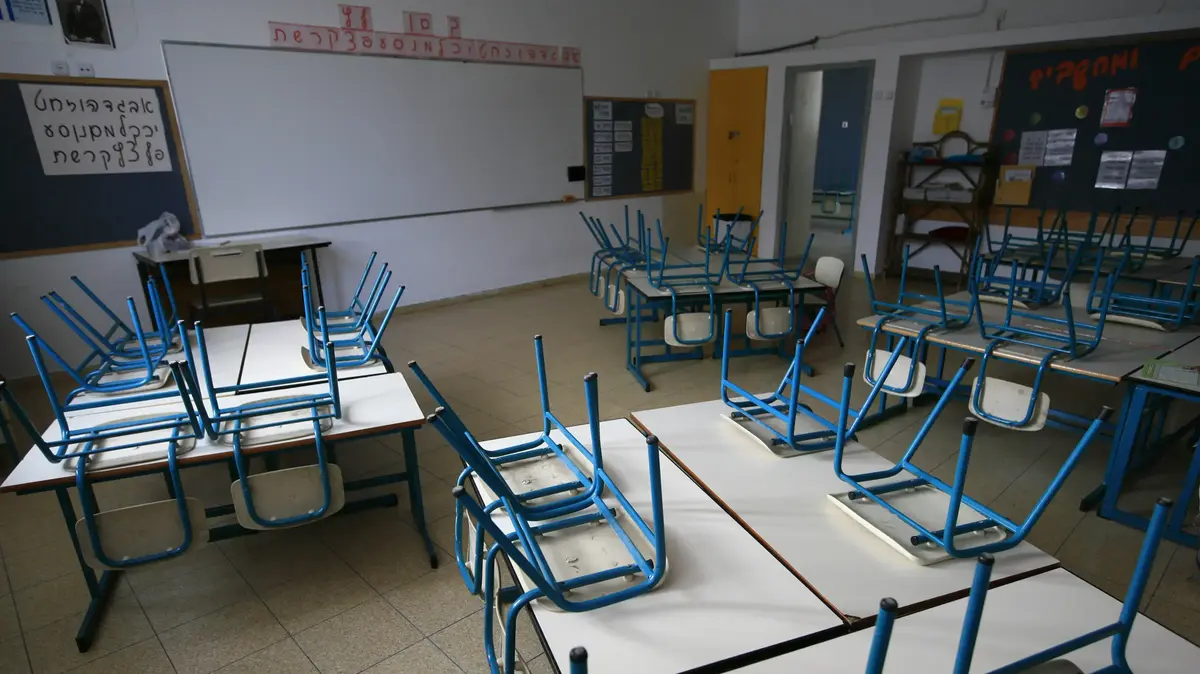Enlarge image
Nursery children on the playground
Photo: Arne Dedert/dpa
Germany is running out of pedagogical staff, the inequality of opportunity is still serious, and too many children and young people do not reach the minimum school standards - the current report "Education in Germany 2022" analyzes the "permanent construction sites" in the system.
One of the most serious problems is the shortage of skilled workers in daycare centers and schools.
"We must make greater efforts to find and retain staff," warned educational researcher Kai Maaz when the 420 pages were presented this Thursday.
»There is no doubt that we will have a great need.«
Enlarge image
Researcher Kai Maaz: "We know little about the people who work in day care centers and schools"
Photo: Stefan Boness/Ipon/IMAGO
He called the analysis a "first comprehensive educational assessment in the light of the corona pandemic".
The crisis – understood as an “exogenous shock for which the education system was not adequately prepared” – sharpened the focus on problem areas and had a significant impact on educational activities.
Maaz is director of the Leibniz Institute for Educational Research and Educational Information and spokesman for an independent group of experts that presents an inventory of the German education system every two years.
This time she explained the personnel situation as the main topic.
Where the bottlenecks are greatest
On the one hand, the experts describe that the number of employees in the education sector has increased significantly over the past ten years, especially in day-care centers.
The increase here is 75 percent.
On the other hand, significantly more children are now spending more time in day-care centers and schools on average, so that the “child-care ratio has hardly improved at all”.
According to the experts, the shortage of pedagogical specialists will worsen in various areas.
When the statutory all-day entitlement for primary school children takes effect in 2026, there will be an increased need for staff.
So far it is unclear how this can be covered.
Most recently, 54 percent of primary school children were cared for all day, but according to parents' wishes, the need was 63 percent.
The report pays particular attention to the situation in day-care centers.
"The shortage of skilled workers is currently and will be the greatest challenge for the field of early education - especially in West Germany," the authors write in a summary.
The corona pandemic has exacerbated the shortage of personnel, “so that this bottleneck will become a key question of the future viability of early education in the coming years”.
The group of experts found it striking that although figures are recorded for employees in the education sector, there are hardly any other studies and data on them;
about their pedagogical skills.
»We have a data desideratum here.
We know little about the people who work in day-care centers and schools,” says Maaz.
This would be useful in order to derive any further training measures that may be necessary.
The further training of pedagogical staff is legally anchored in the respective federal states, but there is no uniform obligation nationwide.
Participation often remains a "private matter," according to the report.
However, the staff must be further qualified in order to be able to meet changing requirements, for example through digitization.
The pandemic has greatly accelerated digitization in schools.
"We have to preserve these innovative moments now," says Maaz.
Digital technologies could be used even more for individualized learning, which may also have a relieving effect on the personnel situation.
Many teachers work part-time.
If the full-time quota could be increased, these resources could be used to alleviate the shortage of staff, said Maaz.
"We also have to think about solutions that nobody has thought of before." According to the researcher, there is hardly any representative data on how programs for lateral and lateral entry into school work have proven successful.
The consequences of inequality of opportunity
Social inequality with regard to educational opportunities has been a point of criticism in almost every education report in recent years;
so also this time.
"The connection between social background and educational success remains strong and thus reduces the chances of equal social participation for all children and young people," write the authors.
They base this on the following factors:
From kindergarten to primary school, children from privileged families learn more about language and mathematics than children from socio-economically disadvantaged families.
The education system cannot compensate for these differences in the development of skills.
In 2016 and 2019, primary school children from socio-economically stronger families had a performance advantage of around one year in German and mathematics compared to those from socio-economically disadvantaged families.
Pupils from disadvantaged social backgrounds are less likely to acquire the general higher education entrance qualification than those from better-off families, the ratio is 31 to 79 percent.
Young people with Abitur who come from non-academic families study less frequently than those with academic parents.
According to the report, not only school performance is decisive for taking up a course of study, but also “social expectations” that parents, educators, teachers and others have of children.
According to the researchers, it has not been proven whether and to what extent the corona pandemic with sometimes months of alternating and distance teaching will affect the school performance of individual groups.
However, initial findings indicated that boys, underperforming students, children from migrant or disadvantaged families are particularly affected by performance losses.
The corona crisis has exacerbated inequality of opportunity.
According to the report, state-specific surveys indicate that the overall level of competence of primary school children in 2021 was "significantly lower" than that of their peers in previous years.
Overall, the proportion of children with insufficient skills in Germany is still too high, says Maaz.
Why it's unfair from the start
From a statistical point of view, the chance of school success is particularly low if children grow up in »risk situations« with a view to education.
This refers to the socio-economic living conditions of the parents.
Parents with low formal qualifications are at risk if none of the parents in the household have a university entrance qualification or completed vocational training.
A social risk situation exists when neither parent is employed.
A financial risk situation is assumed when the household income is below the risk of poverty line.
Children with a migration background are affected by at least one risk situation much more frequently than children of German origin.
It is remarkable, said Maaz, that 40 percent of under-six-year-olds in Germany live in a migrant family.
Every fifth child between the ages of three and six speaks little or no German at home.
Especially in West Germany, many day care centers have a high proportion of children whose family language is not German.
“That in itself is not a dramatic finding,” says the educational researcher.
“But does the system respond appropriately?
We need different framework conditions nationwide in order to support these children better.« Visiting a day-care center can compensate for a lot of what parents do not do in terms of support.
But children in “risk situations” of all people have so far been less likely to visit a day care center than children from privileged families.
According to the researchers, there is also some evidence in the daycare centers that educational inequalities have increased due to the at least partial closures during the pandemic.
The language skills of children who do not speak German at home could be particularly affected.
»We will not be able to completely dismantle the connection between social background and school success.
That would be an educational policy illusion,” said Maaz.
"But we can mine it harder."
more on the subject
Study at 111 elementary schools: fourth graders can read significantly worse than before the corona crisis by Silke Fokken
Long-term study on the state of the universities: »Speed too slow, not enough progress« by Armin Himmelrath
OECD country comparison »Education at a glance«: This is how the German education system is by Miriam Olbrisch
Corona and schools: »We have to clarify what justice means in the education system« An interview by Silke Fokken
New study: Lack of staff, old equipment - that's how bad it is for German daycare centers by Silke Fokken
So far, this has not been successful, among other things, said the educational researcher, because in Germany daycare centers are still primarily about care instead of education.
Other countries are already a few steps further.
Maaz criticized that if some of the children in school do not meet the minimum standards, this usually has no consequences.
"The teachers continue with the material." All-day care could theoretically help to compensate for poor performance, but so far this has by no means been geared towards education and quality across the board.
"The problems in the education system cannot be solved within one or two legislative periods," sums up the education researcher.
"That's why we have to set ourselves goals now, what we want to achieve and when, in order to make the system faster and more responsive, not least with a view to crises like the pandemic, but also wars and mass exodus."















